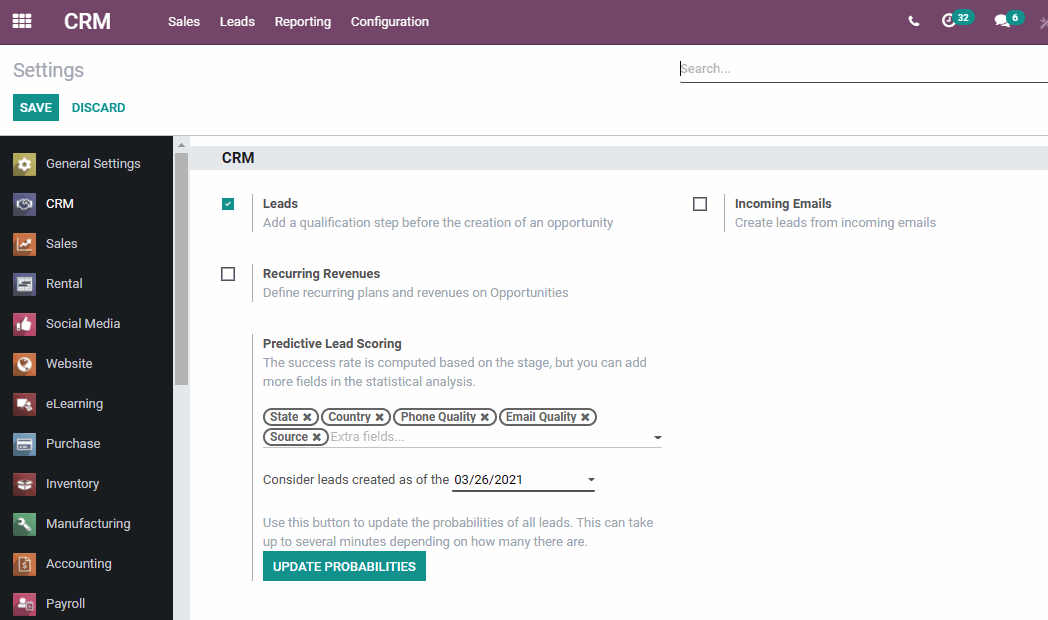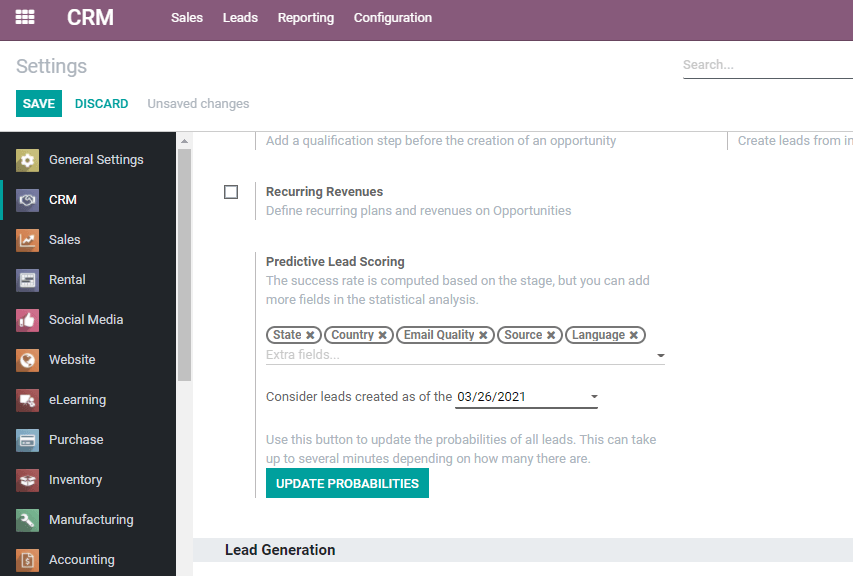Odoo CRM Lead Scoring
A lead is simply a conversation or contact with a potential client. Leads may also be equated with market prospects. A lead is any interaction that a sales team retains or collects. That is, the lead may be a prospective customer or a contact.
In industry, various businesses keep leads in the hope that these leads or sales contacts will become clients at some point in the future. From an ERP standpoint, a lead may be any information such as a prospective buyer's phone number, email address, or social media account.
We are generating an increasing number of leads through advertisement, marketing, live chat, direct mailing, and other marketing activities. We may obtain sales offers through a variety of activities such as direct contact, internet communication, or mass media activity.
A touch is considered a successful lead, if their features or purchasing habits are more similar to those of your buyer classes. In such situations, the person is more likely to become a client as a result of a lead.
In today's business world, every organization aims to generate as many leads as possible or to generate as many successful leads as possible, which are more likely to become customers.
For lead generation and management in the ERP era, marketing relies more on ERP and CRM tools. ERP allows us to easily integrate various marketing tools, which can aid in lead generation. CRM and ERP marketing and customer relationship software can be combined with email marketing, SMS marketing, and marketing automation tools. Aside from that, websites, blogs, live chat, and other features can be combined to collect as many leads as possible. An ERP tool can also help with the conversion of leads to customers.
If you have a sufficient number of leads, the next step is to determine their degree of interest. That means you could be carrying 100 leads. However, only 50 of the total will be interested in your product, and only 10 of the 50 will actually purchase it. To make the best use of leads and schedule conversations and events, you must first determine the level of interest. At this stage, lead scoring will come in handy.
What is Lead Scoring?
Lead scoring can be described as the act of using some values in numerical forms', to determine the level of interest. This procedure is carried out automatically by newly developed and upcoming ERP software.
However, in order for the computer to learn the process and produce reliable results, we must have those attributes. The characteristics of the lead may be his or her current state, age, or occupation. A leader who is a college student, for example, is less likely to buy child care goods. Around the same time, a lead over the age of 50 is more likely to buy geriatric support tools.
Lead Scoring Attributes
The lead's demographic details
The geography of the lead's location or the group to which the lead belongs determines the lead's chances of being a customer.
A consumer will provide demographic information as an attribute, which will allow you to set negative points if the lead does not meet your demographic requirements. Assume we add country as a scoring attribute. Assume you're selling warm clothing and don't have a sales outlet or distribution service. If your lead is from India, your ERP will immediately award you negative points.
This will assist the lead management method in identifying the lead from the list of potential customers.
Information about the business
Details about the lead's business or organization may also be chosen as an attribute for lead scoring.
It will assist you in identifying the type of industry and the size of the industry, as well as identifying those who are unlikely to be your client.
Email delivery speeds
Many who are interested in doing business with your company would undoubtedly read your emails. If the email remains unclicked or the individual unsubscribes from the email, the lead scoring will deduct points from the lead.
Lead scoring based on predictive analytics
Predictive lead scoring is the technique that has elevated the lead scoring system to a higher degree. This approach can assist you in identifying the characteristics of current customers by using online data and machine learning techniques. This will also assist you in comprehending the characteristics of new leads. Furthermore, it will assist you in ranking the potential buyers based on the report.
This will assist the sales team in planning business tactics based on probability.
Odoo CRM Lead Scoring
Odoo CRM is a comprehensive customer relationship management tool that has been adopted by a wide range of industries and companies worldwide.
It facilitates predictive lead scoring and assists businesses in effectively planning various operations.
Navigate to Configuration in the Settings menu, Predictive Lead Scoring can be found here.

Various fields can be found under predictive lead scoring. State, Nation, Phone Quality, Email Quality, Source, and so on are some of the fields.
These are some of the fields that have already been used in predictive lead scoring. However, we have the choice to add or delete fields as we see fit. The success rate of an opportunity in Odoo is determined based on its level. The fields applied to predictive lead scoring, on the other hand, play an important role.
Let us delete some of the fields and replace them with others. We may, for example, exclude phone quality from the list.
Instead, we'll use Language in the fields. The fields can be added based on our preferences.

Now that we've finished selecting areas, we can save the changes and move on.
This is how Odoo CRM assists us in establishing predictive lead scores and effectively managing lead generation and management.
50,000+ companies run Odoo to grow their businesses.
Join us and make your company a better place.


